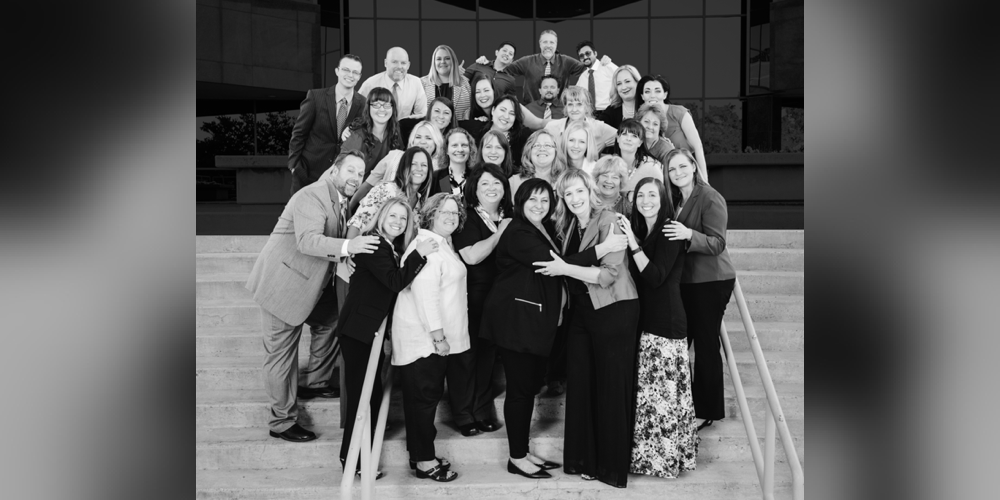frequently define our work in terms of the numbers: 1.5 million claims billed, 1 million patient statements, 276,000 patient billing calls. Our team of 300 is busy!
A few years ago, our CFO (now CEO) Gordon Crabtree challenged us to find more cost-effective ways to do our work so we can bring better value to our patients. We started thinking about working smarter and wondered about our culture. How do we keep 300 people motivated and engaged?
Thinking differently: Get to know yourself
First, we acknowledged that change was necessary. We needed to spread the skills our leaders had–accountability, empowerment, trust and open communication–to our entire staff. To do that, we knew we had to get to know ourselves a bit better. A coach helped us understand our own traits and challenges.
Clear is kind

Clear is Kind. Unclear is Unkind.
Leadership expert Brené Brown shares a simple but transformative insight.
After some soul searching, I realized I’m a “hinter.” Instead of providing direct guidance, I hint. For example, I would say things to my team like, "We need to do X." What I really meant to say was, "I want you to do X." It led to confusion. No one was really sure who was responsible and sometimes things just didn't get done.
I have to consciously correct myself or think, "Am I being clear?" Now, everyone in my department asks me for clarification if I’m not being clear.
Define what makes you successful
All of our Revenue Cycle Support Services team members came up with their own definition of success by asking one question: At the end of the day, how do you know it's been a good day?
One example from our team came from an employee who takes patient billing phone calls. This is how she defined success: “I reduce financial stress for our patients.” What I love about that is this person’s success is not the number of calls she takes, but about how she is making a difference in the lives of our patients.
Empower the team: Accountability and communication
We wanted to instill a sense of empowerment at all levels of our staff to resolve issues and focus on the patient. Our team decided to implement a strategy for one-call resolution. Every employee was empowered to resolve patient billing questions and concerns the first time the patient calls.
We empowered the team to really make and own their decisions. We trusted them to do the right thing for both the patient and the organization. And patient feedback has been overwhelmingly positive.
We believe accountability is empowering. It’s not punitive or scary. In fact, we experienced a real shift in our culture, demonstrated by reduced turnover, increased employee engagement and better efficiency suggestions from our staff.
We encourage fact-based communication (rather than interpretations) as a cornerstone to successful accountable conversations. Throughout our journey, we’ve owned our successes and our mistakes with transparency. And we’ve celebrated the things that we learned from.
What’s Next?
There's always opportunity to grow and do better. A number of our leaders have participated in the Advanced Leadership program through Hospitals and Clinics’ Organizational Development team. Additionally, our internal training team has expanded our revenue cycle professional development program at all levels. We have a supervisory prep course for our staff interested in leadership roles, as well as a supervisor academy to help to grow our current supervisors.
At every team level and staff level, we provide professional development with ongoing focus on accountability and believing that you can make a difference.
Annotated transcript from Kathy Delis' speech at the Oct. 31, 2018, Leader Development Institute in Salt Lake City, Utah.
Kathy Delis
To disagree means failing to agree. Synonyms include to contradict, challenge or debate. Synonyms do not also have to include to argue, quarrel, dispute, bicker or clash. Pediatric intensivist Jared Henricksen shares the best path forward when words become clouded with emotion.
Your social media feeds are awash with tips for working from home, but how do you lead from home? Karen Wilson and Dawn Newberry, of University Medical Billing, have led remote teams for years. Their experience boils down to one principle: build and maintain connection.
Exceptional care only happens with an engaged team. Jared Wrigley should know: he has led three diverse teams at U of U Health—first, Westridge Health Center, and now, South Jordan’s primary care team and Parkway Health Center. Here are three effective ways he engages everyone on the team.
